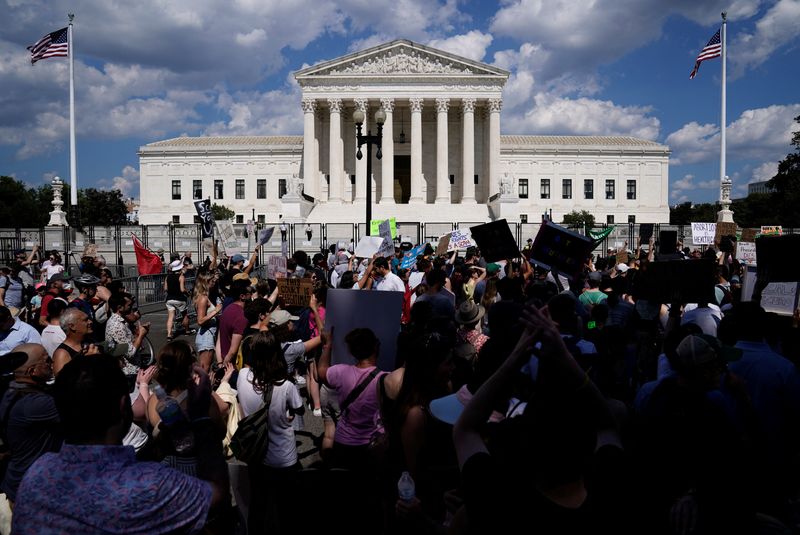By Ahmed Aboulenein
WASHINGTON (Reuters) - Major companies including JPMorgan Chase & Co (NYSE:JPM), Amazon.com Inc (NASDAQ:AMZN) and Walt Disney (NYSE:DIS) Co have said they would pay travel costs for employees seeking abortions out-of-state after the U.S. Supreme Court overturned the landmark 1973 Roe v. Wade ruling that legalized the procedure nationwide.
Here is what you need to know about how corporate abortion-related travel policies might work:
HOW COULD THIS WORK FOR EMPLOYEES?
Large companies could offer travel benefits either as part of their health insurance plan or as a separate health benefit. Benefits experts say additional ways to offer reimbursement are still being developed.
In a health plan the benefits would likely be handled in the same way as other out-of-network health services. The employee would submit not just for the care but for travel and other expenses as allowed. They may have to cover some of the costs.
Employers may also make funds for abortion-related travel expenses available through a health plan that integrates a Health Reimbursement Arrangement, a tax-free fund employees can use for qualified medical expenses.
Both options may leave out the biggest users of abortion services, according to data from the Guttmacher Institute: low-income women. Some companies do not include all their hourly workers in their plans and are likely to give reimbursement for costs rather than pay upfront.
WHAT ABOUT PRIVACY?
If the benefit is part of a health plan, it would be protected under the Health Insurance Portability and Accountability Act or HIPAA, which requires insurers to keep an employee's health information confidential and secure.
While employers generally are not subject to HIPAA, when large corporations act as insurers and cover the cost of medical services, they must follow the law. They typically outsource benefit management to an additional outside company, which also is obligated to uphold HIPAA protections.
Inside a company, a firewall typically separates people who work on a health plan. Coworkers and supervisors should not have access to any health information, including the use of abortion travel benefits.
There are exceptions in HIPAA for law enforcement. A state that criminalizes abortion could request information related to these benefits on those grounds. It is unclear how that would interact with federal privacy laws. This potentially exposes employers to legal risks.
DO MANY COMPANIES ALREADY OFFER THIS? No. A Mercer survey of 708 employers conducted before the expected Supreme Court decision found that 14% of employers with over 20,000 employees said they either already provide or plan to provide abortion travel benefits. Another 25% said they were considering it, 46% said they were not, and 11% said they do not have employees in states where the benefits are necessary. WHAT ABOUT SMALLER EMPLOYERS?
The Mercer survey shows that the smaller the employer, the less likely they are to offer such coverage.
Among employers with over 500 employees, just 3% said they provide or plan to provide these benefits and 18% said they were considering it. Another 15% said they did not have employees in states that would need it.
Small employers rely on insurers such as CVS Health Corp (NYSE:CVS)'s Aetna or UnitedHealth Group Inc (NYSE:UNH)'s UnitedHealthcare to handle all aspects of their health plans including the medical costs.
This kind of insurance is subject to state financial laws and regulations, which would include restricting or banning abortion access.

Overall, there are 25 states that ban abortion coverage in their state's government subsidized health insurance offered under the Affordable Care Act, and 11 of them ban abortion coverage altogether, according to the Guttmacher Institute. Public employee insurance plans are banned from covering abortion in 22 states.
CVS said it would offer out-of-state abortion services to employers who request them. UnitedHealth said it was reviewing the Supreme Court decision.